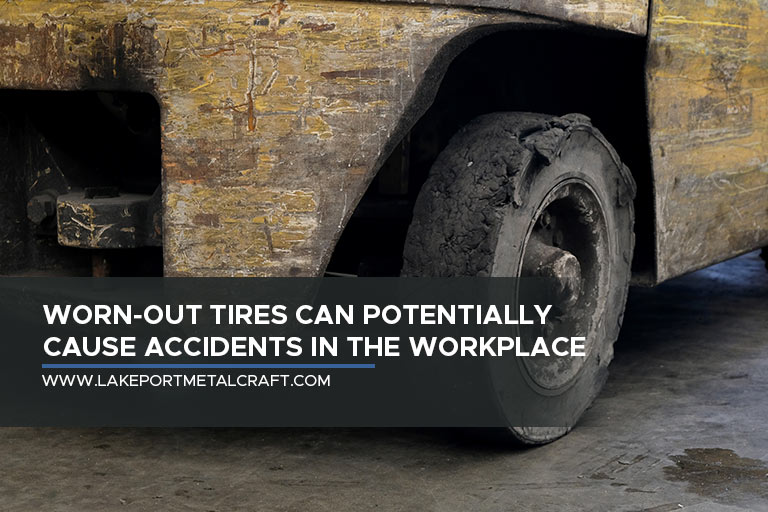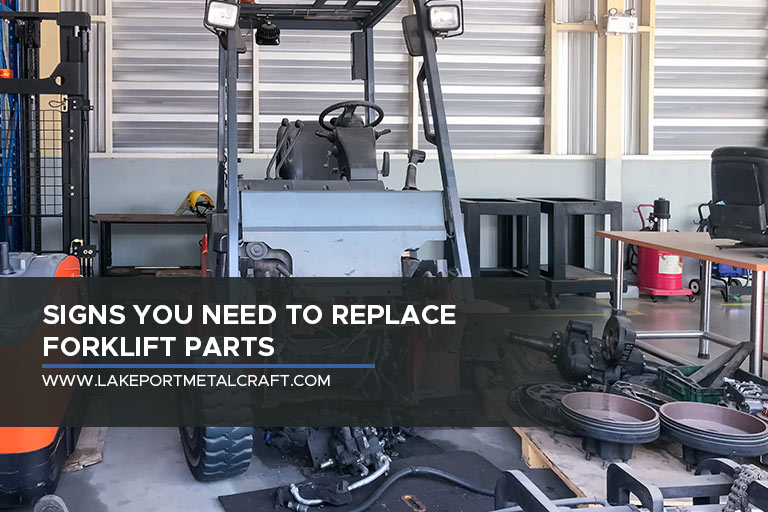Forklifts are workhorses often used for lifting and moving in construction and warehouse operations. Despite regular maintenance and tune-ups, some parts require replacement sooner than others. Worn-out forklift components can delay or even bring the operation to a complete stop. To prevent the disruption of your business, be sure to check for forklift issues caused by damaged parts.
We identified some of the most common signs that indicate the need for forklift replacement parts ASAP!
- Worn out Tires

With frequent use, forklift tires typically require regular inspection and replacement. Worn-out tires can affect the performance, ride, and appearance of the machine. Among the most common signs that it is time to replace old tires are cracking, tearing, and flat spots. Also, if the tires have worn down to the brand name etched on their side, it indicates that you have about a hundred hours left before they become totally unreliable.
Another sign to watch out for is when you notice small chunks falling off from your tire. Chunking is a sign that you should immediately get replacements as the old tires are unsafe to use and do not work well, putting the forklift operator at risk of an accident.
- Clogged Filters
Oil, air, and fuel filters need regular preventative maintenance service to ensure peak forklift performance. Clogged filters can reduce fuel efficiency, which can lead to engine damage and forklift overheating issues. Routine maintenance can ensure that your filters are clean and keep the axles greased for maximum performance.
If the engine emits a strong fuel odour, it can mean there is an issue with the filters. You should immediately tag out the forklift from service as it can lead to the dangerous build-up of carbon monoxide in the warehouse. To keep the indoor air quality within the facility safe, be sure to schedule routine preventative maintenance for your forklifts. Professional forklift technicians can perform exhaust emissions tests to verify that your machines are safe to use.
- Damaged Hose
Hoses help transport fluids throughout the forklift truck. Like other components, they can wear out over time. However, the fluid hose replacement schedule varies depending on the type, location, and usage factors.
-
- Power Steering Hose
While the power steering hose does not easily rupture or wear down, you may notice the results of a damaged line. You may experience forklift steering problems, such as jerkiness in the steering column or a stiff steering wheel. The power steering hose should be replaced when it reaches 3,000 to 4,000 hours of operation.
- Power Steering Hose
-
- Hydraulic And Reservoir Tank Hoses
Ruptured or worn hydraulic and reservoir tank hoses can cause oil and brake fluid leaks, worn cylinders, and problems with braking and shifting. Be sure to replace it after 3000 to 4000 hours of operation.
- Hydraulic And Reservoir Tank Hoses
-
- Fuel Hose
If you have internal combustion (IC) forklifts, check the fuel hose for spills and leaks as it can be extremely dangerous in certain work environments. Watch out for signs of damage, such as visible leaks, a misfiring engine, and strong fuel odour. It requires replacement after 3,000 to 4,000 hours of usage.
- Fuel Hose
- Worn Out Forklift Mast

The forklift mast is the upright assembly on the front, which is designed to lift, lower, and position loads. Consisting of various parts, this complex system requires regular care and maintenance to keep it working at peak performance. One or more broken parts in the forklift mast can cause sudden drops and several safety hazards. A single damaged part can also lead to damage to other mast components as well.
Metal-on-metal contact is among the most common forklift mast problems. The most common indications of metal-on-metal contact include grinding sounds and scrape marks. If you notice either of these signs, contact a professional to re-adjust or replace the damaged forklift mast part(s).
Another warning sign to watch out for is uneven or bent fork tips. Dinged forks not only slow down the operation but also result in product damage. When the lift starts to move slowly, does not go as high as it should or fails to move, you may need to hire a professional forklift technician to replace the defective forklift mast parts to restore the function of the mast system.
To check the condition of the fork, inspect the condition of the fork blade and the back teeth of the calliper. It usually indicates a 10% threshold damage if the back teeth overpass the fork back. This means you need to take the machine out of service ASAP. On the other hand, if you notice the back teeth hitting the fork blade, the damage to the unit is below the 10% threshold and is safe to use.
- Elongated Forklift Chains
Forklift chain replacement should be carried out every 6 to 12 months. However, there are several factors that can affect the rate of damage to the chains, such as the types of lifting equipment, usage, and load. The most effective way to determine the wear and elongation of the forklift chains is by using a chain gauge. If the elongation measures over 3%, it implies you need to replace the forklift chains.
- Depleted Brakes
A typical brake lasts about 5,000 to 7,000 operating hours. However, driving patterns and driver behaviour can affect the health of the brakes. For example, driving long distances without obstacles can slow down the wear and tear of the brakes, as opposed to the aggressive use of brakes.
If you notice any weird noise or delay in stopping the forklift when using the brakes, you need to have the brakes replaced or at least conduct an immediate inspection. Make sure to check them on a regular basis even if they do not show any signs of damage.
Safety should be a top concern for companies operating forklifts. Even a single damaged part can result in forklift-related accidents. In addition to routine maintenance checks, companies should take extra precautions to protect their forklift operators.
Installing a forklift rear post ensures optimum protection for forklift operators from injuries caused by potential under-ride accidents in your workplace. Call Lakeport Metal Craft at 416-587-5809 for more information about The Backbone®.


